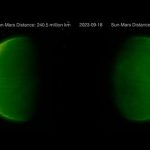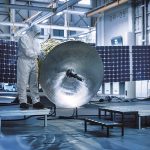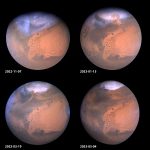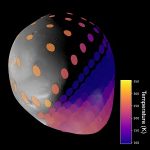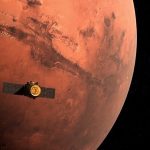The Emirates Mars Mission will study the Martian atmosphere, the relationship between the upper layer and lower regions.
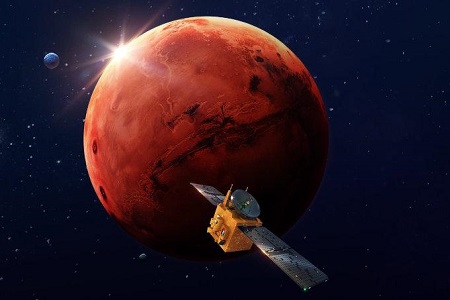 The Emirates Mars Mission (EMM), the first interplanetary exploration undertaken by an Arab nation, has completed a year since its launch from Tanegashima Space Centre in Kagoshima Prefecture, southwestern Japan on July 20, 2020.
The Emirates Mars Mission (EMM), the first interplanetary exploration undertaken by an Arab nation, has completed a year since its launch from Tanegashima Space Centre in Kagoshima Prefecture, southwestern Japan on July 20, 2020.
Speaking about the first-year report, Omran Sharaf, Project Director of EMM, said: “Weve had quite a lot of wiggle room in addition to our planned parameters and our confidence in our spacecraft has gone from strength to strength. We were able to cut the number of trajectory correction manoeuvres, perform additional observations during our flight to Mars and now have added a whole area of scientific study to the mission that I can only describe as a bonus. It has been a very busy year for Hope!”
The launch from Tanegashima commenced a 493,000,000-km journey to reach and orbit the Red Planet, with an original seven Trajectory Correction Manoeuvres (TCMs) cut to four because of the spacecrafts outstanding performance during the Launch and Early Operations Phase (LEOPs). This conserved resources and allowed the EMM team to perform a series of observations en-route to Mars.
EMMs Emirates Mars Ultraviolet Spectrometer (EMUS) instrument was activated during Hopes cruise to Mars and used to image Mars exospheric hydrogen. The instrument was also cross-calibrated with the PHEBUS spectrometer aboard the European Space Agencys BepiColombo spacecraft, itself en-route to Mercury.
Hessa Al Matroushi, EMMs Science Lead, added: “These experiments were possible simply because Mars Hope was in such good shape. Because resources were available and the spacecraft performance so exceeded planning scenarios, the dust tracking feature of Mars Hopes star tracker instruments was also enabled, allowing measurements of interplanetary dust in the wake of Mars as it spins around the sun.”
With the successful Mars Orbit Insertion (MOI) manoeuvre taking place on February 9, 2021, the Mars Hope spacecraft once again performed impeccably, transitioning to its unique and highly elliptical 20,000 by 43,000-kilometre science orbit on March 23 with its last scheduled big burn of its six Delta-V thrusters.
The probes three instruments were activated on April 10 and a period of commissioning and testing followed, before the missions science phase formally commenced on May 23. It was during this period that the EMM science team first made the stunning observations of Mars discrete aurora that have electrified the global Mars science community, releasing the first global images of Mars discrete aurora in the far-ultraviolet, and providing new insights into the discrete aurora phenomenon in Mars nightside atmosphere.
Utilising additional data handling and bandwidth available, the mission can continue to make regular observations of Mars aurorae. The most sensitive ultraviolet instrument yet to orbit Mars, Hopes EMUS is able to image these dynamic auroral events globally at high resolution and across a wide range of wavelengths, providing an unprecedented window upon the interaction of the atmosphere with solar particles.
While previous studies had theorised the discrete aurora is tied to Mars magnetic fields and existing observations had been consistent with that theory, prior images of this phenomenon at this quality had only been available as artists impressions.
Al Matroushi continued: “Mars aurorae are an area of intense interest to the global scientific community and their study has tremendous potential to challenge, expand and deepen our understanding of Mars atmosphere and its interaction with the planet and with solar energies. We were hopeful that EMUS could make a contribution in this area but we now know with absolute certainty that contribution is going to be ground breaking.”
Hope is following its planned 20,000 43,000 km elliptical science orbit, with an inclination to Mars of 25 degrees. The probe will complete one orbit of the planet every 55 hours and will capture a full planetary data sample every nine days in its two-year mission to map Mars atmospheric dynamics. Science data from the mission will be released globally with no embargo, following a period of validation and checking, in October 2021.
The Emirates Mars Mission will study the Martian atmosphere, the relationship between the upper layer and lower regions and, for the first time, the international science community will have full access to a holistic view of the Martian atmosphere at different times of the day, through different seasons. In addition, it will now aim to make significant contributions to our understanding of Mars aurorae.
The Hope Probes historic journey to the Red Planet coincides with a year of celebrations to mark the UAEs Golden Jubilee.










































































